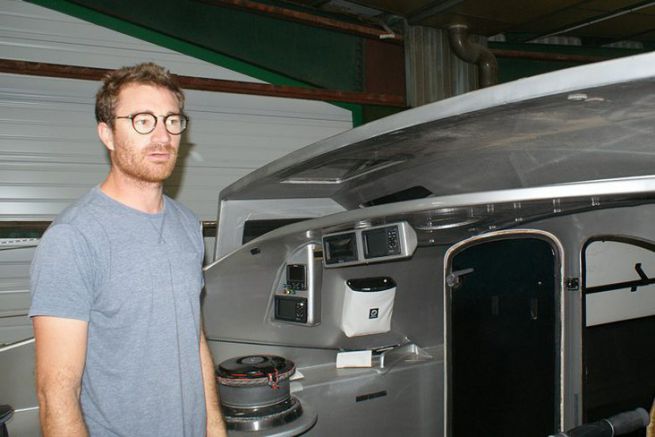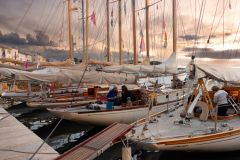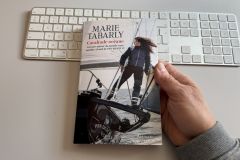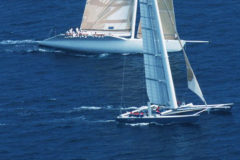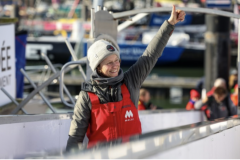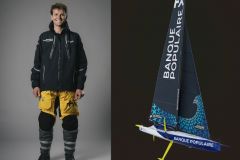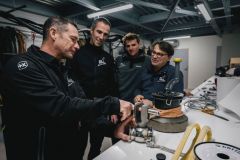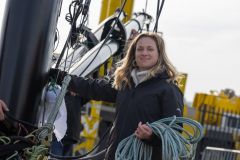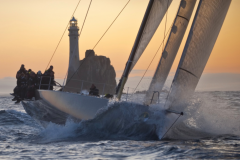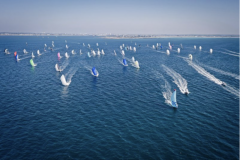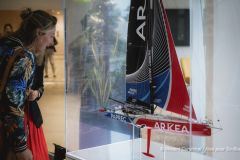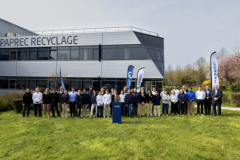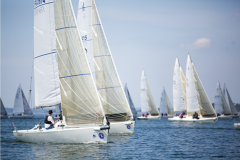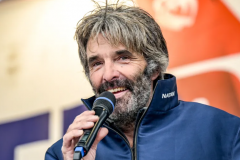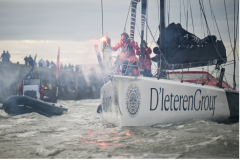In this summer 2019, Benjamin Dutreux welcomes us to Les Sables-d'Olonne on the IMOCA renovation site that he has just acquired. He tells us about his career and his plans for the Vendée Globe.
Can you tell us about your first memory at sea?
It was at the Yeu Island Sailing School on a small catamaran. Something like a Teddy. I was 9-10 years old and it was one of my first boat trips.
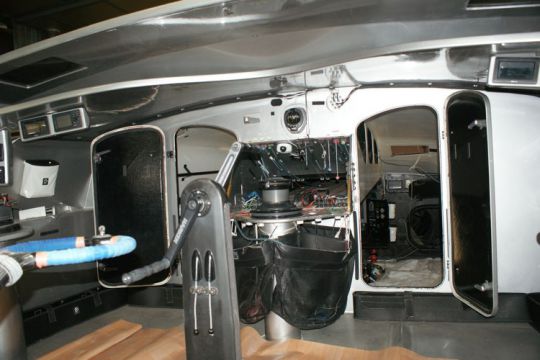
Can you tell us about your journey since then?
As we lived on the island, sailing gave me the opportunity to take a trip at sea. I joined the yachting club. We were sailing on a habitable, an Aquila. We also had a Gib'Sea 80 and we did small regattas with a very friendly club atmosphere.
I liked sailing and I wanted to improve. At that time, I tried a lot of sports. I was looking for myself and I was looking for what I wanted to do. I was playing football, volleyball and in the end I hooked up with the boat. I liked to go and get the small adjustments.
I made inquiries to join a sports school and joined the sailing school in Fromentine. It's a great sports school, contrary to what you might think. They are very dynamic, very structured with coaches. That's when I started the sport catamaran when I was 18. I was at school on the island of Yeu. On Wednesday, I took the boat to the mainland, the coach came to pick me up directly in security at the finish and dropped me off on the catamaran that had been prepared. We were lucky to have a great coach. He didn't count his time and accompanied us on races and championships when he was just a "sailing instructor". I was the oldest of a group of 6 young people. There was a great dynamic. That's where I know Aymeric[Dary - now skipper of Diam 24 Homkia] and Joris[Cocaud]. We were racing against them.
So I raced in a sports catamaran in departmental, regional, national and then international regattas. I stopped to go to university to study. I joined the sailing section of the University of Nantes. Lucky for me, I fell into a period when there was a good dynamic. I met Joris there and met Gatien[Planson], Fred Denis, Seb Simon and the whole team. We used to fight on Thursday afternoons on the water. We won all the university regattas, but far from an international level.
I then worked for Sirena for 5 years. I developed the racing activities: F18 and Spitfire S that I presented at speed training for the Olympics. I kept racing for them, and next to that I managed the production.
At the time I had sent an application for a selection in Figaro, but Morgan Lagravière was selected. Before becoming Team Vendée, it was a departmental agency with a big budget - something like 300,000 euros per boat per year. It lasted four years before it stopped. Team Vendée was created and got the boats back. When they launched the association, they contacted the "young" profiles of which I was a member again - in the meantime I had made a selection of Crédit Mutuel de Bretagne hopefuls.
I was 23 years old and working at Sirena's when they called me to take a Figaro tour of Brittany. We were 6 pre-selected. Lucas Rual and I were chosen. We did that without really knowing how it could work. We have worked well and achieved good results. So they asked me to ski the Team's J80 the following year. That year, they didn't have enough money to do the Solitaire. But the following year, they chose me to run the Solitaire du Figaro. To give myself the means and get into the race, I resigned from Sirena.
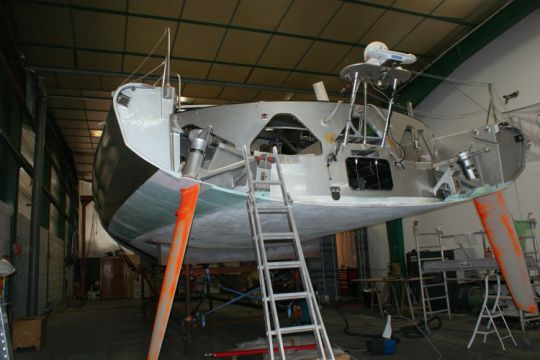
Before being selected in Figaro, did you consider doing so?
It made me dream, but I never thought I'd be able to do it. As I was working, I had this opportunity to do just one tour of Brittany that I accepted. But the next November, I was asked, "Are you ready to take the helm of the boat for the whole next season?" It took me a few months to decide before I left my job. I did the first season as a pledge for the Vendée Team. At that time, I had never spent a night at sea before.
The second year, the Vendée Team continued to lend me the boat and I started to form a sponsor group to be autonomous on the 3rd e year. The 4 e year, last year, everything went on.
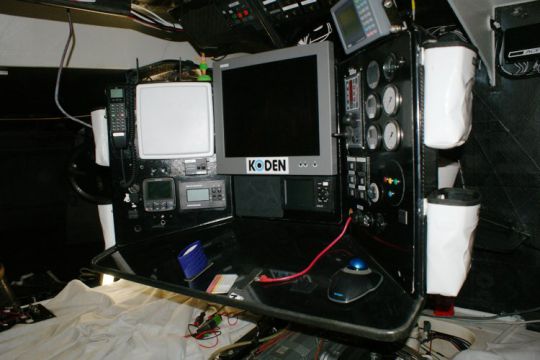
Why didn't you continue in Figaro 3 in 2019?
I would have loved to do Figaro 3, but it wasn't going well. I absolutely wanted to launch the IMOCA project that was close to my heart and I wanted to take the opportunity to be young to give momentum to this project.
As things progress, I realize that children's dreams are achievable. Either I was still waiting a few more years before embarking on the Vendée Globe, or I'm already starting to get used to buying a second-hand boat. There are beautiful stories - like Alan Roura's - of people who started from nothing and have great projects. It's not at all to say that you should go, at some point you have to go! So we gave ourselves the means to set up the project.
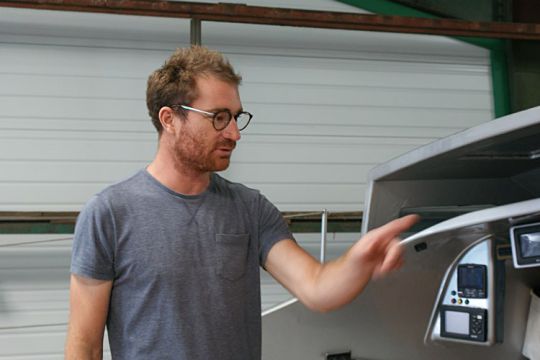
As a skipper, what was your greatest achievement?
It is not so much a particular thing, but a sequence of things and opportunities. For example, we won a SL16 world championship - it was the first "open" years - there were a lot of people and level. I had to pass my bac bac rattrapage - I hadn't studied math at all and he was my main coef in S... it made me miss the first day of the championship. Then we only did 1, 2 or 3 rounds. We find ourselves grabbing places. On the last day, we could have won if two sets were skipped, but that wasn't the case. We finished 3 e but very happy! That's when I met Odile on the podium. She had just won the championship, first in women's and first overall in front of all the boys. She told me that her teammate would not be there for the world championship, I told her that my teammate would also be absent: "Why don't we do it together? We met 3-4 days before the regatta to practice a little. We won the training round, then we flew over the championship from start to finish. We had a great feeling and it went really well. As we were starting to talk about mixed catamarans, we thought we would continue together. It didn't happen in the end, but if it had happened 3-4 years later, we would have continued together in Nacra. She preferred to focus on her legal studies and I went to university. So end of story, but it was a great adventure. I like this kind of sequence of unexpected situations that build something beautiful.
The same goes for last year on the AG2R Transat with Fred: great atmosphere, very human project, we are doing well, we are 3 e when you dismast... It was hard. We had been working all winter, the boat was well prepared. The insurance companies wouldn't pay us back. We worked like no other way to get out of it. Gatien came to give us a hand to fix the boat. We buy a second-hand mast from Gildas Morvan. The mast is heavier, we thought we'd never make it. A week before the Solitaire, I send the sails to the sailmaker so that he can resize the luff ring because the mast is stiffer. We were leaving thinking about getting spanked, but in the end it's my most beautiful Solitaire. I hadn't been able to train much and little by little I'm making progress until I can do a great race. It's stories like that that I like: finding little things that make you bounce.
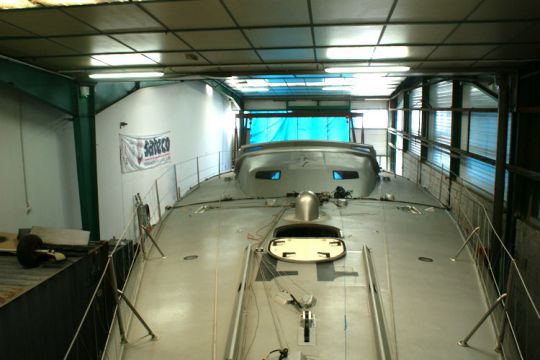
Let's talk about your Vendée Globe project: why did you choose this boat?
I didn't have much choice. There were still 3 boats available second-hand, otherwise it was necessary to build a new boat. At the origin of the project, we would have liked to build. We had started talking with Vincent Riou to make a sister-ship of Seb Simon. But we needed money. Despite a good lead, it didn't do it. So we headed off to buy a used car.
There was this boat in Japan quite a bit, but we were losing two months to get it back. Another one that is easier to access - Eric Bellion's old boat - but less efficient with the keel to be rebuilt.
Thomas and Gatien went to Japan to see the boat, make sure there were no problems and that it was what we were looking for. They came back saying that the boat is top-notch and well built. It's a boat with a great track record. I went back to Japan to negotiate with the owner. So we decided to do a big rush to get a good, light boat, on which we could potentially put foils rather than have a worse boat with less history.
For the anecdote, the whole piano is written in Japanese. We're deciphering everything. Same for the radar, all buttons are in Japanese.
The boat was delivered without a mast. After his dismasting during the Vendée Globe, Kojiro Shiraishia bought a mast in England and put it back on the boat to do public relations in Japan. During a storm, the boat heeled and hit the travel lift crane, breaking the second mast..
Inside, we see that Hugo Boss' team had a budget, there are many small details of finishes that are very accomplished.
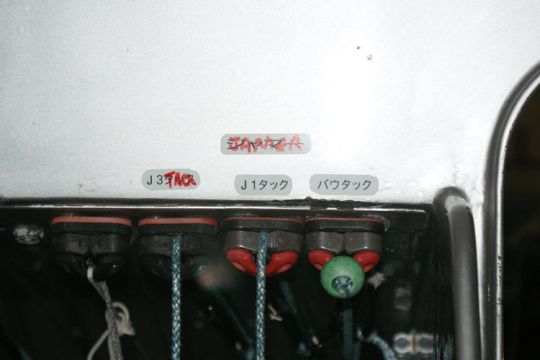
What will be the major project between now and the launch?
The big project is the mast that is being manufactured at Eole Composite in Vannes. This is the point that could put us behind schedule because it's the only thing we don't know internally. They're going to deliver the mast in several sections and we'll assemble it here with their teams. This is the solution we found to get a cheap mast. In IMOCA everything costs a fortune. The rigging is 80,000 euros.
We are lucky to have a great team and guys who come to help us out. We are starting to have visibility at the sponsor level next year, but this year, even if we have some sponsors, we will have to tighten our belts.
Then we have Clément who's here to rebuild all the electricity. We have a partnership with Robin Marine to redo all the electronics and switch to NKE with a brand new HR pilot. On board, the electronics were flawed with an old-fashioned H3000 network. We are also reviewing all energy systems.
The third file is that we have never done an IMOCA except a little with Arnaud Boissière who invited us to do the Guyader Grand Prix and 2 or 3 outings. We need to take the boat in hand and get familiar with it.
But before sailing, we have to take everything apart, check everything and send it for revision. In the middle of August when everyone is on holiday, it's not always easy...
We would like to launch in mid-September 2019 and mast at the end of September. We must then be in Le Havre on October 18th for the start of the Transat Jacques Vabre (start on the 27th). Knowing that you have to qualify in doubles beforehand. I was offered to do it during the delivery with a route through the Fastnet and arriving in Le Havre, but it's hot. If there's any problem, it's too risky. I will try to do so at the end of September.
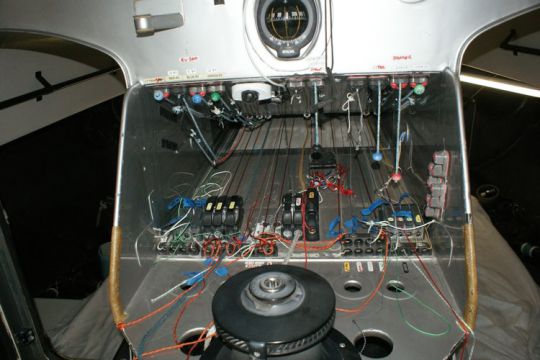
What is your objective for the next Vendée Globe?
Already you have to qualify and be part of the selected ones. To participate in the Vendée Globe, there are 3 points to be satisfied: apply, qualify and be selected.
To apply, we sent the cheque for 20,000 euros and passed all the medical certificates. I sent back all the cards. Our file is 27 e filed with the organization. The second part is to qualify. To do that you have to do 2000 miles alone, which I will do on the return from the Transat Jacques Vabre. I'm going to make a journey between Salvador of Bahia and the Acores.
And finally, the third part is to be selected. Today the organization says there are 30 places. All skippers who have new boats are automatically selected: there are 8 new boats. All those who have already completed a Vendée Globe are also qualified: 5 skippers. So it reduces the number of seats quite a bit. I believe there are 35 files submitted to the IMOCA class. So now we have to make the maximum number of miles. We're going on the Jacques Vabre, then we're going to do The Transat and then New York Vendée. Otherwise we do Bermuda, Fastnet... we're not advanced, but we're going to do all the next races.
